DevOps tools cover the complete software lifecycle. They help at all development stages - from code checking to deployment and monitoring. The primary objectives of DevOps are enabling frequent software releases and automating a wide range of tasks. DevOps also enhances development speed and scalability.
There are many types of DevOps tools on the market. So, we decided to prepare an overview article on them, classifying tools into categories. This DevOps tools list will help experienced specialists to keep descriptions of working tools at hand. Thus, experts can refresh their memory if necessary. Our article also will be helpful for beginners not to spend days looking for information online.
DevOps tools encompass a wide range of technologies and frameworks that facilitate the adoption of DevOps practices. These instruments can be categorized into various areas. These fields include testing, security, monitoring and logging, patch management, automation, and others.
Below we will highlight the most useful and proven tools that are worth attention in 2024.
DevOps discovery tools
The first step we recommend conducting when starting software development is product discovery. In the discovery phase, the DevOps team engages in research and scoping activities to define the project's objectives. This phase involves essential tasks. These are conducting user research, establishing project goals, and determining success criteria.
Product discovery serves as the initial step in product design. This stage is the foundation for informed decision-making. During product discovery sessions, valuable information about user problems is gathered. So, this research enables the development of effective solutions.
Let’s consider some tools that are commonly used in the stage of product discovery and collaboration in the context of agile practices.
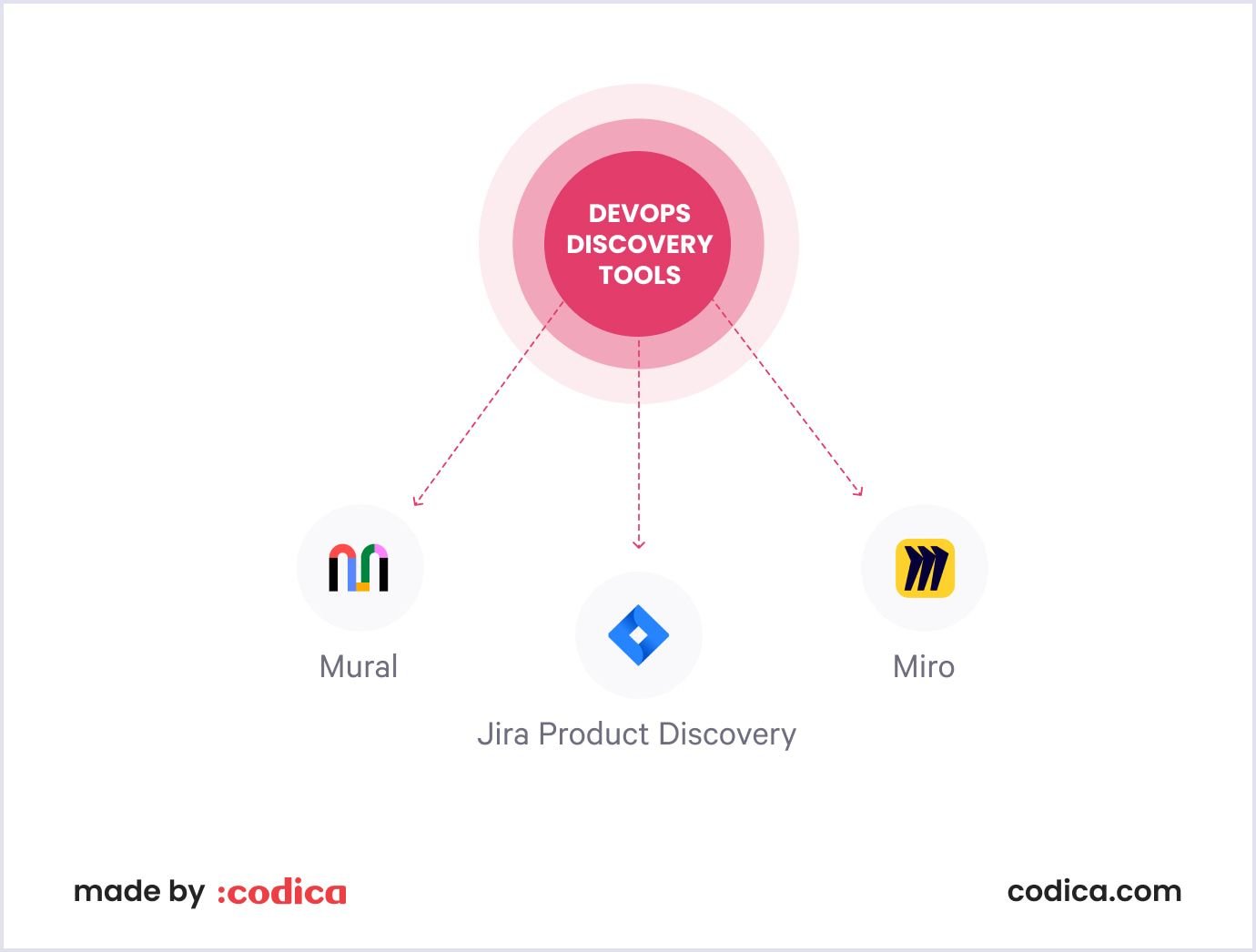
Mural. It is a popular digital workspace and collaboration tool that enables teams to create visual content together. It provides multiple pre-built templates and visual elements. It additionally facilitates real-time collaboration and seamless integration with popular tools. For example, these tools are Jira and Trello.
Miro. This flexible online whiteboard and collaboration platform empower teams to create and collaborate on visual projects. It offers an extensive collection of templates, shapes, and icons. This tool enables multiple team members to collaborate simultaneously, making it a perfect choice for remote teams.
Jira Product Discovery. This tool facilitates organizing the information into actionable insights. Also, it helps prioritize tasks for development teams. It's crucial to consider the backlog of user feedback when setting priorities.
We recommend seeking tools that facilitate asynchronous brainstorming. They allow everyone to share and provide comments on various aspects. These aspects include ideas, strategies, goals, requirements, roadmaps, and documentation.
DevOps continuous integration and deployment tools
Continuous integration (CI) and continuous deployment (CD) are critical practices in DevOps. They revolve around automating the process of creating, testing, and deploying software apps.
There are several tools available to facilitate CI/CD pipelines and streamline the software delivery process.
DevOps continuous integration
An essential practice in DevOps, continuous integration (CI) focuses on repeatedly integrating code changes from different developers into a central repository. There are numerous tools that help facilitate CI. They automate the building, testing, and integration processes.
Here are some popular CI tools used in DevOps services:
Jenkins. This tool is a widely adopted open-source CI server that offers extensive plugin support and flexibility. It allows for the automation of build, test, and deployment processes. Also, it integrates with multiple version control systems, deployment platforms, and build tools.
Azure DevOps Pipelines. It is a cloud-based CI/CD platform with robust CI capabilities. Azure DevOps Pipelines support building, testing, and deploying applications across different platforms. Besides, it integrates seamlessly with Azure services and other popular tools.
GitLab CI/CD. This tool is a built-in CI/CD solution provided by GitLab. It allows for defining CI pipelines using a declarative configuration file (.gitlab-ci.yml). Also, it offers powerful features. They include parallel execution, caching, and integrated container registry.
CircleCI. It is a cloud-based CI/CD platform that offers fast and reliable CI workflows. It offers easy configuration using a YAML file. Also, it supports parallelism, caching, and integrations with popular version control systems.
Travis CI. This cloud-based CI platform is built specifically for GitHub repositories. It provides a straightforward setup and configuration process using a YAML file, which is a human-readable data serialization language. This tool is generally compatible with various programming languages and frameworks, offering support across the board.
TeamCity. It is a powerful CI/CD server. It supports building, testing, and deploying apps across various platforms and technologies. TeamCity provides an intuitive user interface and extensive integration capabilities.
Bamboo. This tool is a CI/CD server presented by Atlassian. It allows teams to automate the test, build, and deployment processes. Bamboo integrates easily with other Atlassian tools (Jira, Bitbucket), providing end-to-end traceability.
GitHub Actions. This is a CI/CD platform tightly integrated with GitHub repositories. GitHub Actions enables the creation of workflows using YAML files. This CI tool provides a wide range of actions and integrations to automate the CI/CD pipeline.
To sum up, all these CI tools help automate the process of integrating code changes, building apps, and running tests. They are also helpful for providing feedback to developers quickly.

DevOps deployment tools
Deployment tools in DevOps are designed to automate the process of deploying software apps to diverse environments. They help ensure efficient and reliable delivery.
Here are some popular deployment tools used in DevOps:
AWS CodeDeploy. This tool is a fully guided deployment service offered by AWS (Amazon Web Services). It automates the deployment of apps to EC2 instances, AWS Lambda functionality, and on-premises servers. In general, AWS CodeDeploy allows for easy and scalable deployments.
Google Cloud Deployment Manager. This tool enables the automation and management of infrastructure deployments on the Google Cloud Platform (GCP). It uses declarative templates to define and deploy cloud resources and services.
Octopus Deploy. It is a deployment automation tool designed for .NET applications. Octopus Deploy simplifies the deployment process. This tool provides a user-friendly interface, release management capabilities, and integrations with various platforms and tools.
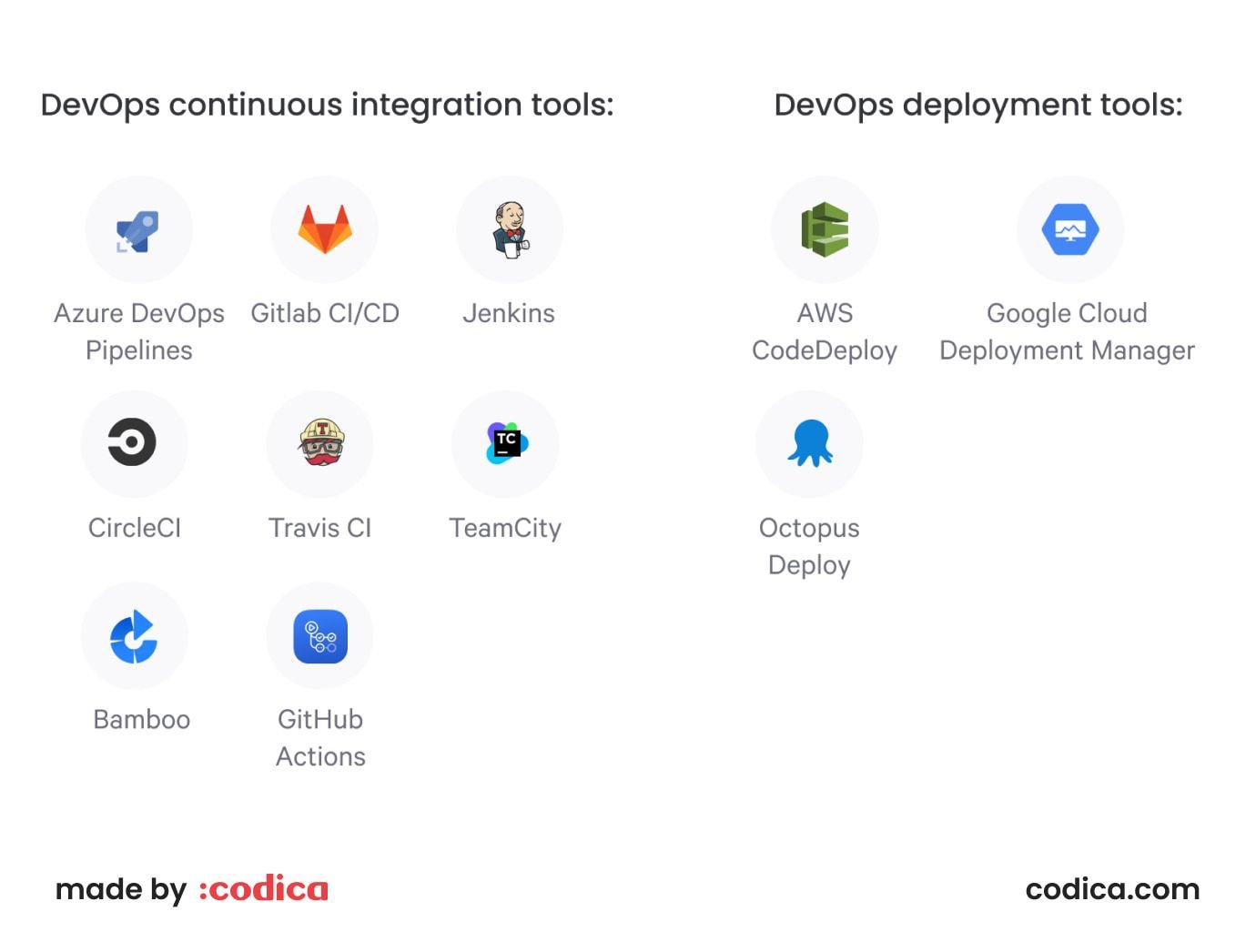
DevOps testing tools
Testing is a critical aspect of the DevOps process. Quality testing ensures the reliability and capacity of the software. There are various checking tools available that support different types of testing in the DevOps lifecycle.
Below you can see some popular testing tools for DevOps:
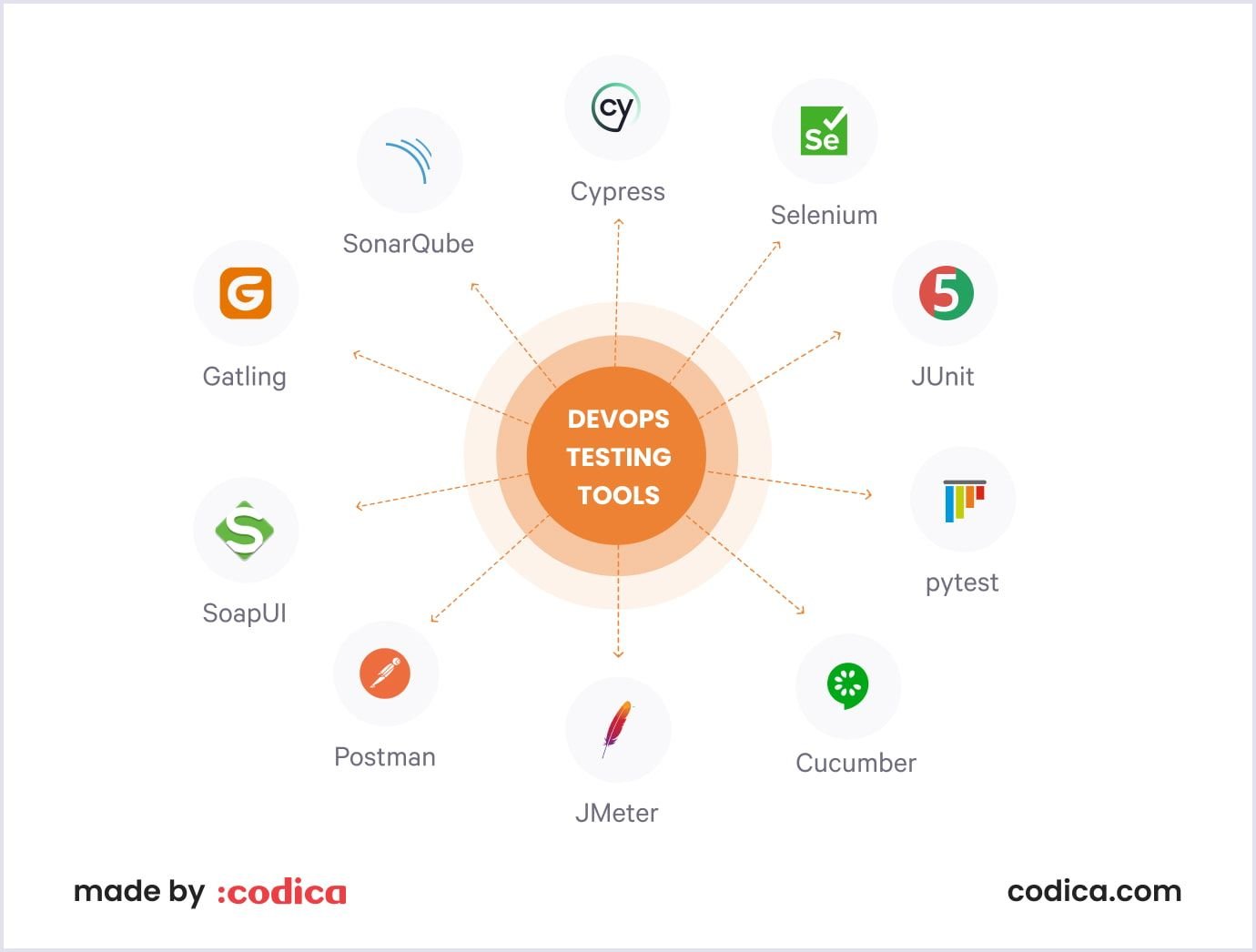
Selenium. It is a widely used open-source testing framework for web apps. Selenium enables automated functional testing across different browsers and platforms. Thus, teams can create and execute tests using various programming languages.
JUnit. This is a widely used unit testing framework for Java apps. It provides a simple and standardized approach to writing and executing unit tests. Thus, it ensures the correctness of individual components and methods.
pytest. It is a mature and feature-rich testing framework for Python applications. This tool streamlines the process of writing tests. Pytest supports various types of testing and offers powerful assertion capabilities.
Cucumber. This behavior-driven development (BDD) tool facilitates collaboration between stakeholders, developers, and testers. It allows teams to define tests in a human-readable format and supports multiple programming languages.
JMeter. Apache JMeter is a performance testing tool. It is used to measure and analyze the performance of apps under different load conditions. It supports various protocols, simulates heavy loads, and generates performance reports.
Postman. It is an API testing tool that facilitates the process of checking APIs. Postman offers a user-friendly interface for creating, executing, and validating API requests and responses. Thus, it enables comprehensive API testing.
SoapUI. This is a widely used testing tool for SOAP and RESTful web services. It provides a complete set of features for performance and functional testing. This tool is also helpful for the security testing of web services.
Gatling. It is a high-performance load-testing tool that is designed for scalability. Gatling allows teams to simulate thousands of concurrent users and measure performance metrics. It also helps identify performance bottlenecks.
SonarQube. It is another popular tool for static code analysis. SonarQube ensures code quality and compliance with coding standards. Also, it identifies code issues and security vulnerabilities and provides detailed reports to improve code quality.
Cypress. This tool is a modern end-to-end testing framework for web applications. It provides a powerful set of features for writing and executing tests. These tests include real-time reloading, automatic waiting, and time-travel debugging.
Related reading: Who is DevOps Engineer: Skills, Roles, and Responsibilities
DevOps monitoring and logging tools
The market offers several popular DevOps monitoring tools. We can use these tools to monitor and manage various aspects of the DevOps process. These aspects include app performance, infrastructure monitoring, log management, and more.
Here are some widely used DevOps tools for logging and monitoring:
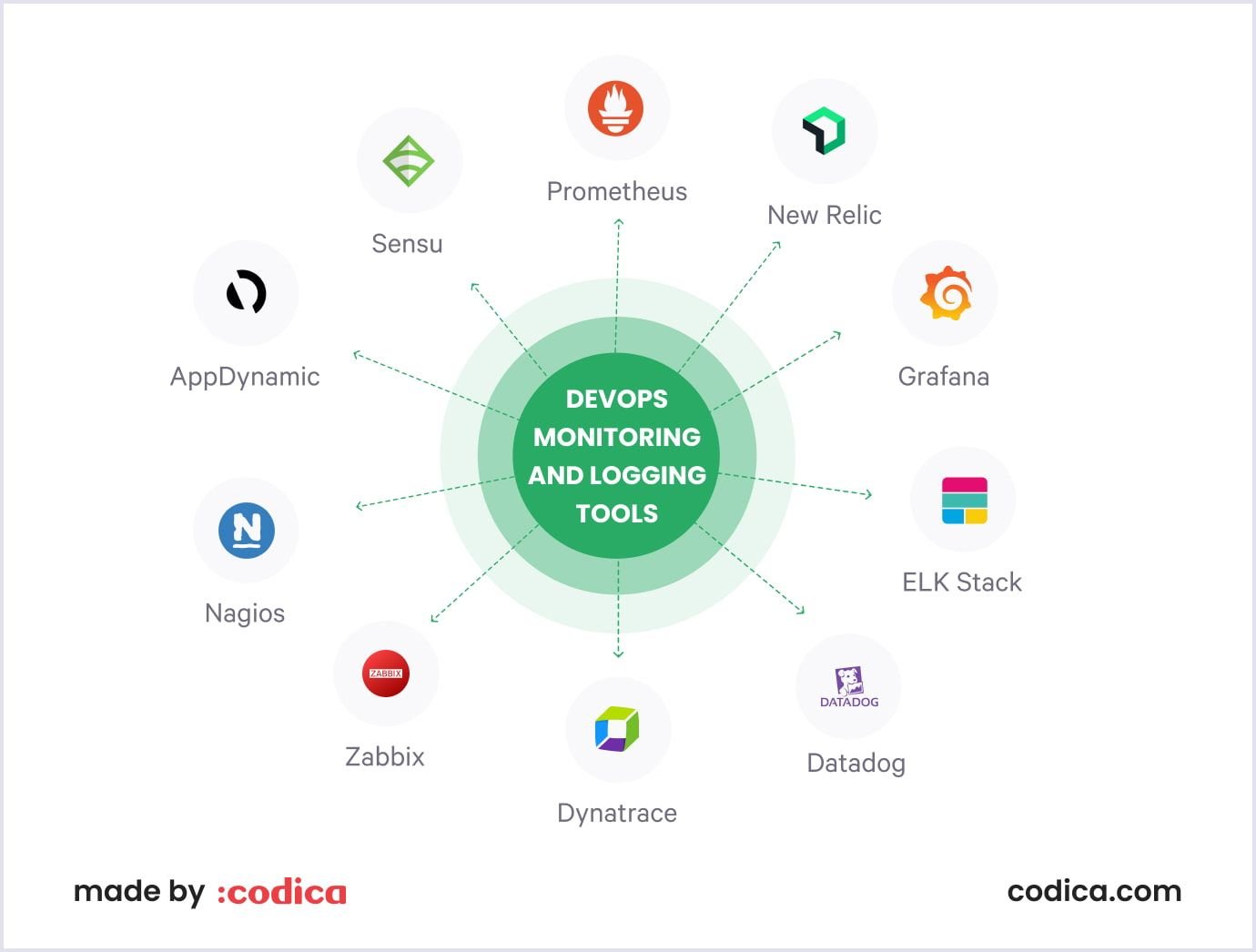
Prometheus. An open-source alerting and monitoring tool that collects and stores time-series data. It has a powerful querying language, and its ecosystem includes Grafana for visualization and Alertmanager for alerting.
New Relic. A comprehensive monitoring and observability platform. It helps monitor the performance of apps, infrastructure, and customer experience. It offers APM app performance monitoring (APM), infrastructure monitoring, real-time analytics, and more.
Grafana. A widely used open-source visualization tool. It works well with multiple data sources, comprising Prometheus, Elasticsearch, and InfluxDB. Grafana provides interactive and customizable dashboards for monitoring metrics and logs.
ELK Stack. The ELK (Elasticsearch, Logstash, Kibana) Stack is a widely used combination of log management and analysis tools. Elasticsearch is a distributed search and analytics engine, and Logstash is a log processing pipeline. Kibana is a visualization platform.
Datadog. It is a cloud-based monitoring and analytics platform that offers a wide range of features. These include infrastructure monitoring, APM, log management, and more. It supports various integrations and provides real-time insights.
Dynatrace. A full-stack monitoring platform. This tool provides end-to-end visibility into apps, infrastructure, and user experience. It uses artificial intelligence to find out and analyze performance issues automatically.
Zabbix. An open-source monitoring tool that offers network, server, and app monitoring capabilities. It supports agent-based and agentless monitoring and provides various notification options.
Nagios. A popular open-source monitoring tool that offers comprehensive monitoring and alerting capabilities. It supports the monitoring of hosts, services, network devices, and more. Nagios has a large community and offers numerous plugins for extending its features.
AppDynamic. A performance management and monitoring tool. It gives insights into app performance, user experience, and business impact. AppDynamic offers features like APM, infrastructure monitoring, and business analytics.
Sensu. This open-source monitoring framework focuses on monitoring infrastructure and application health. Sensu supports both agent-based and agentless monitoring. It also provides flexibility in defining checks and notifications.
DevOps automation tools
DevOps automation tools are crucial in streamlining and accelerating software development and delivery processes. These tools streamline a range of tasks. These are infrastructure provisioning, app deployment, and configuration management.
Let’s discover the top DevOps tools for automation:
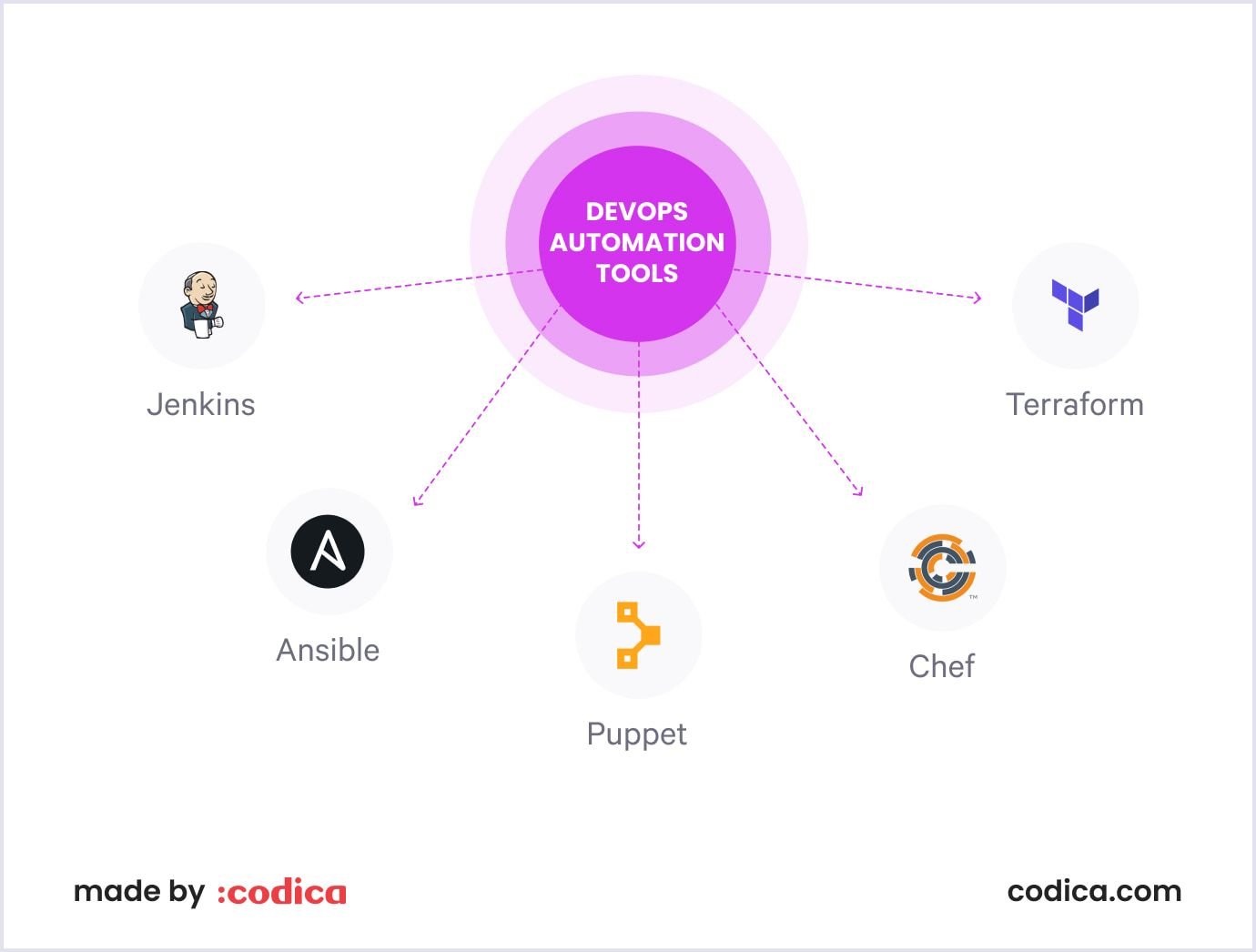
Jenkins. This open-source automation server aids in building, deploying, and automating software creation pipelines. Jenkins automates various tasks. These are provisioning infrastructure, deploying apps, and managing configurations.
Ansible. It is a popular open-source automation tool that automates app deployment, configuration management, and infrastructure provisioning. Ansible uses declarative language and SSH (Secure Shell Protocol) to execute tasks across multiple systems.
Puppet. A configuration management tool that automates infrastructure and app provisioning, configuration, and management. Puppet uses declarative language to determine the desired state of systems.
Chef. Another configuration management tool. It provides automation for infrastructure and app management. Chef uses a Ruby-based DSL (Domain-Specific Language) to define configuration and automation tasks.
Terraform. This infrastructure provisioning tool enables you to define infrastructure as code. Terraform supports various cloud providers and infrastructure platforms. Thus, this tool makes it easy to automate the management and creation of resources.
DevOps orchestration and containerization tools
DevOps containerization and orchestration are two interrelated concepts. They work together to streamline the software creation and deployment process.
Containerization is a key component of DevOps practices. This practice enables teams to package apps and their dependencies into isolated and portable containers. Containers offer a lightweight and consistent environment. It can run on any operating system or infrastructure, making deploying, scaling, and managing apps easier.
We will also discover some widely used orchestration tools. They focus on managing container coordination, scaling, and deployment in a distributed environment.
When containerization tools are responsible for creating and managing individual containers, orchestration tools manage and coordinate multiple containers. So, the last ones help to build complex distributed applications.
Below you can see some popular DevOps tools for containerization and orchestration:
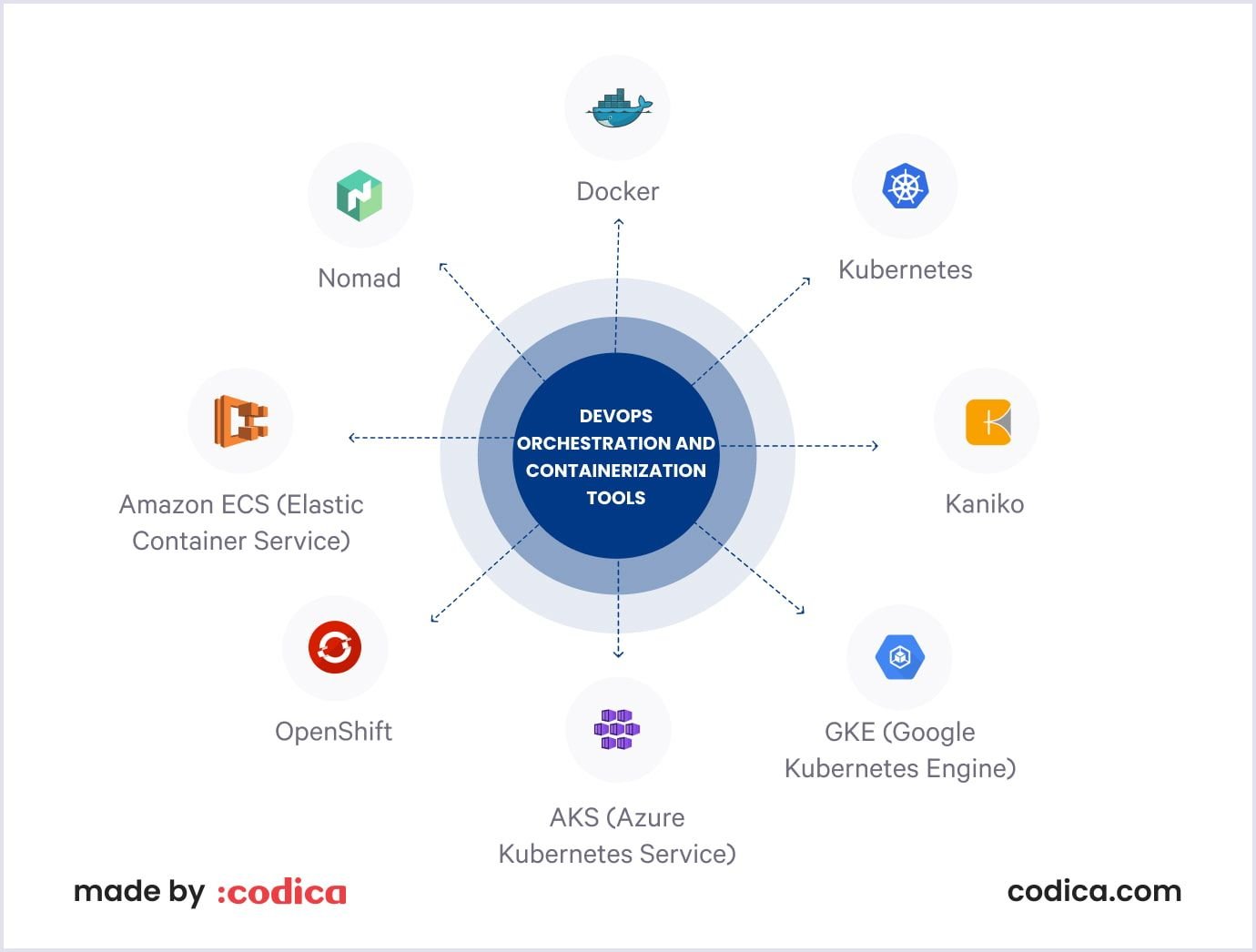
Docker. A containerization platform that enables you to build, package, and deploy apps as lightweight and portable containers. Docker simplifies the deployment process and provides isolation and scalability for applications.
Kubernetes. A container orchestration tool that automates containerized apps' scaling, deployment, and management. Kubernetes provides features like automatic scaling, service discovery, and self-healing capabilities.
Kaniko. It is a container image builder tool designed for building container images within a container itself. Kaniko allows building images without requiring privileged access to the host machine. This tool makes it suitable for use in environments where the host does not allow running Docker directly.
GKE (Google Kubernetes Engine). It is a managed Kubernetes service offered by Google Cloud. GKE allows you to deploy and manage containerized apps on the Google Cloud Platform (GCP). GKE handles the underlying Kubernetes infrastructure. So, it helps deploy and scale applications in a DevOps environment easier.
AKS (Azure Kubernetes Service). This tool is a managed Kubernetes service provided by Microsoft Azure. It offers a fully managed Kubernetes cluster environment for deploying and managing containerized apps on Azure. AKS integrates well with other Azure services, making it a popular choice for DevOps containerization on Azure.
OpenShift. It is a containerization platform based on Kubernetes and developed by Red Hat. OpenShift provides additional features and tooling to simplify the deployment and management of containerized applications. This tool includes built-in DevOps capabilities like integrated CI/CD pipelines and source code management.
Amazon ECS (Elastic Container Service). Amazon ECS is a fully managed container orchestration service provided by Amazon Web Services (AWS). It enables running containers on a cluster of Amazon EC2 instances or AWS Fargate, a serverless compute engine for containers. ECS facilitates the deployment and management of containerized apps in AWS.
Nomad. This tool, developed by HashiCorp, is intended for container orchestration and scheduling. It allows to deploy and manage containerized applications and non-containerized workloads across a cluster of machines. Nomad provides a simple and flexible approach to container orchestration, making it suitable for DevOps environments.
DevOps security tools
DevOps security is a critical aspect of modern software creation practices. To ensure the security of the software development life cycle and CI/CD pipelines, various tools and practices are employed.
Here we collected some examples of popular DevOps security tools:
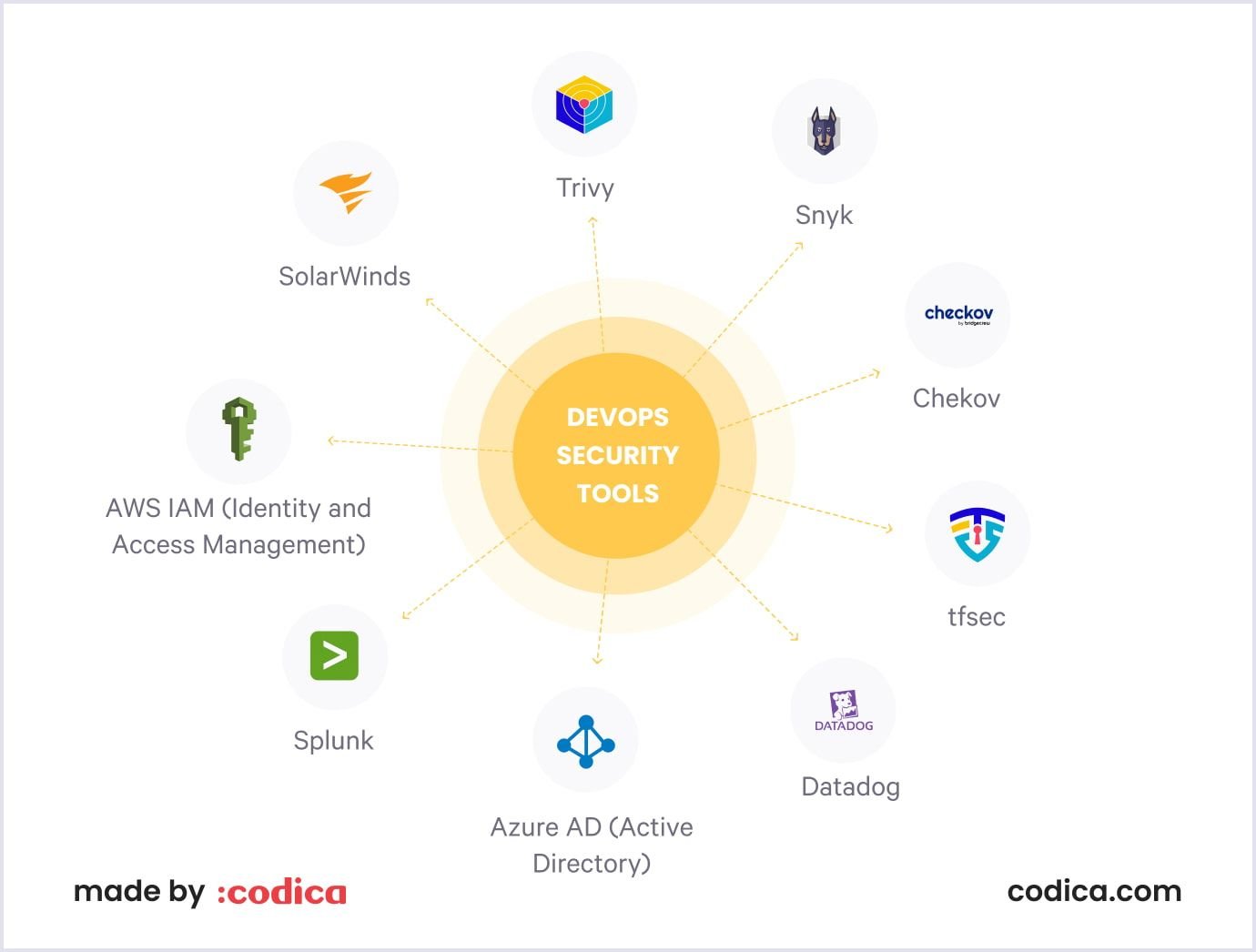
Trivy. This open-source vulnerability scanner is designed for containerized environments. It scans container images. Also, it identifies security vulnerabilities in the installed software packages and libraries.
Snyk. This tool helps find and fix vulnerabilities in open-source libraries and container images. It integrates with CI/CD pipelines and provides real-time feedback to developers.
Chekov. It is an open-source infrastructure-as-code (IaC) security scanner. Chekov analyzes IaC templates, such as those written in Terraform. This tool identifies security misconfigurations, compliance violations, and best practice issues.
tfsec. It is another open-source tool that focuses on security scanning for Terraform code. This tool helps identify security issues, compliance violations, and potential misconfigurations in Terraform infrastructure definitions.
AWS IAM. AWS Identity and Access Management (IAM) is a service provided by Amazon Web Services (AWS) for managing user identities and their permissions in the AWS environment. It allows fine-grained control over access to AWS resources and helps enforce security best practices.
Azure AD (Active Directory). It is Microsoft's cloud-based identity and access management service. It provides secure authentication and authorization mechanisms for Azure services, applications, and resources. Azure AD helps to control access and protect sensitive data.
Splunk. This platform indexes, collects, and analyzes machine-generated data from diverse sources. It offers security monitoring, log management, and SIEM (Security Information and Event Management) capabilities to detect and respond to security threats faster.
Datadog. It is a monitoring and analytics solution. This tool provides real-time insights into the security and performance of cloud environments. Datadog offers features like log management, app performance monitoring, and infrastructure monitoring.
SolarWinds. This tool is a comprehensive IT management and monitoring platform. SolarWinds provides a range of products for network, systems, and app monitoring, including security-related solutions.
Read also: DevOps Security: Challenges and Best Practices
DevOps patch management and configuration management tools
DevOps configuration management tools help automate infrastructure and app provisioning, configuration, and management. These tools allow for managing complex infrastructure and provide consistency across environments.
Patch management tools help to ensure that software systems remain secure and up to date with the newest updates and patches.
Here are some popular DevOps patch management and configuration management tools:
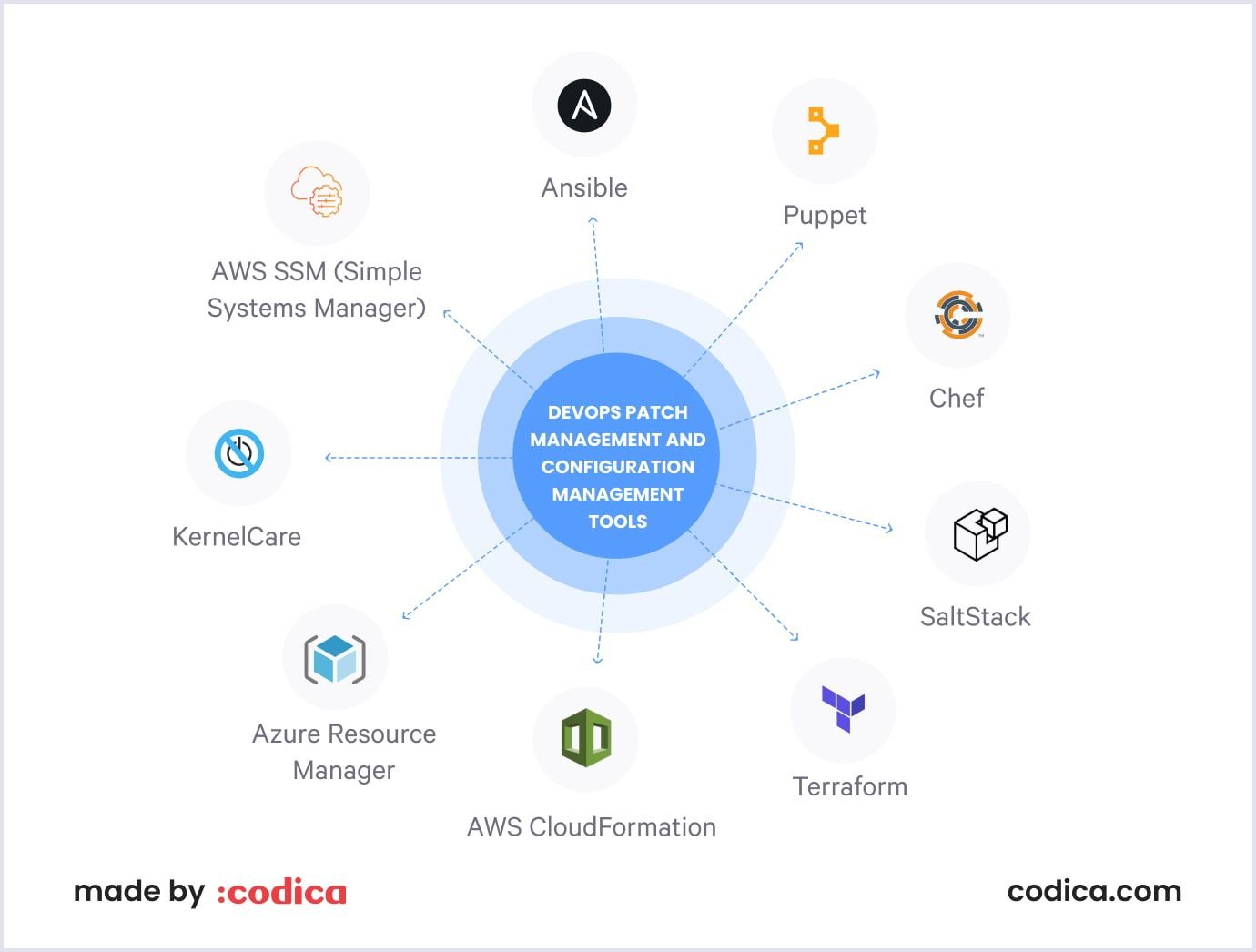
Ansible. It is an open-source automation tool that is used for patching, software updates, and configuration management. It is agentless and uses SSH (Secure Shell Protocol) to execute tasks across multiple systems. Ansible has an active and broad community and supports various platforms and services.
Puppet. This widely used configuration management tool automates the management of infrastructure and apps. It uses a declarative language and a client-server architecture. Puppet provides a rich set of features for configuration management. These features comprise resource modeling, dependency management, and reporting.
Chef. It is an infrastructure automation framework that enables determining and managing infrastructure configurations as code. It uses a Ruby-based DSL (Domain-Specific Language). DSL helps to define configurations and recipes. Chef offers a flexible and extensible approach to configuration management.
SaltStack. This tool, also known as Salt, is helpful for configuration management and orchestration. It uses a master-minion architecture and a YAML-based configuration language. SaltStack provides powerful remote execution capabilities and supports event-driven automation.
Terraform. This infrastructure provisioning and configuration tool allows you to determine infrastructure as code. It supports multiple cloud providers and infrastructure platforms. Also, Terraform enables to provision and manage resources declaratively.
AWS CloudFormation. This service enables determining and managing infrastructure resources using JSON or YAML templates. This tool enables you to provision and update AWS resources in an automated and predictable manner.
Azure Resource Manager. This service provided by Microsoft Azure is intended for managing and deploying Azure resources. It uses JSON templates to determine and manage infrastructure and app configurations. Azure Resource Manager enables to provide and manage Azure resources consistently across deployments.
KernelCare. This DevOps tool provides live patching for the Linux kernel. Thus, it allows continuous application availability, enhanced security through timely patching, and improved operational efficiency. Also, KernelCare helps to ensure compliance with security standards.
AWS SSM (Simple Systems Manager). This tool simplifies and automates operational tasks, enabling centralized management of AWS resources. It offers features such as remote command execution, patch management, automation workflows, and inventory management. SSM enhances DevOps practices by streamlining operations and improving infrastructure management. This tool also facilitates the automation and orchestration of tasks across AWS resources.
Best DevOps tools we use in Codica
Codica specializes in the development of top-notch web and mobile solutions. Our dedicated DevOps engineers assume a pivotal role during the whole software creation life cycle. Their expertise lies in streamlining and enhancing business processes. Thus, they accelerate the full software development process.
Our best DevOps tools include Docker, Terraform, AWS (EC2, S3, ECS, VPC, Lambda, Security Hub, WAF), and Ansible. There are also Vagrant, Prometheus, Grafana, Pagerduty, VictoriaMetrics, Bash, and GO programming languages. We also use Gitlab CI, GitHub Actions, Jira, Trello, New Relic, Linux, and Sentry.
All these tools help us deliver secure and scalable software projects.
For instance, recently, we built a marketplace for collectibles that is called Chattic. Here, individuals have the opportunity to share their prized possessions. Users can also search for new additions within the platform.
This marketplace streamlines the process of discovering antique items and memorabilia. Additionally, the platform provides a convenient space for exchanging advice and engaging in discussions about these unique pieces.
Our DevOps engineer worked thoroughly to the client got a reliable and secure product. The DevOps expert used the tools chosen by Codica. They enabled high DevOps security, automation of processes, rightly integrated testing, and more.
Below is a short video of how Chattic performs in life.
By the way, we should note that the specific tools used in your company may vary depending on your organization's requirements, technology stack, and preferences.
Conclusion
The tools we mentioned in this article are proven and helpful for a DevOps engineer. However, a single list of DevOps tools for each developer cannot be compiled. The selection of tools depends on the choice of language. Therefore, the ability to use tools is only part of the necessary skills.
What tools are used to perform this task and work depends on the software product being developed. Tools are up to the project’s architecture, development language, and the qualifications of the development team.
If you are looking for expert DevOps services, please contact us. Our DevOps solutions will help you to align with your business aims. We produce high-quality software reliably and rapidly.


